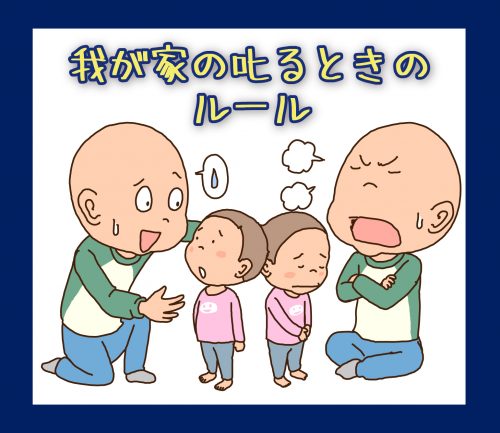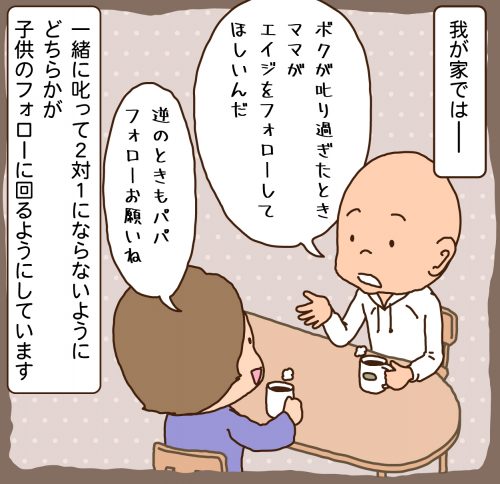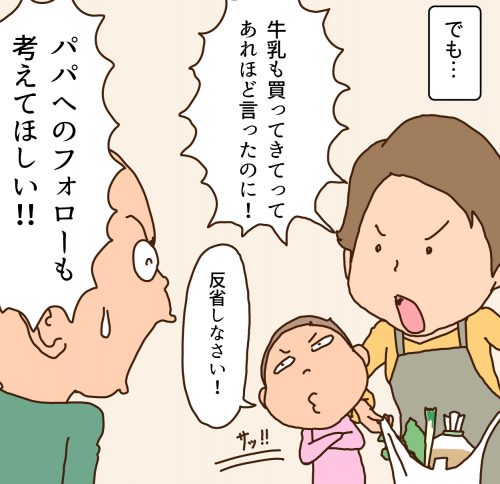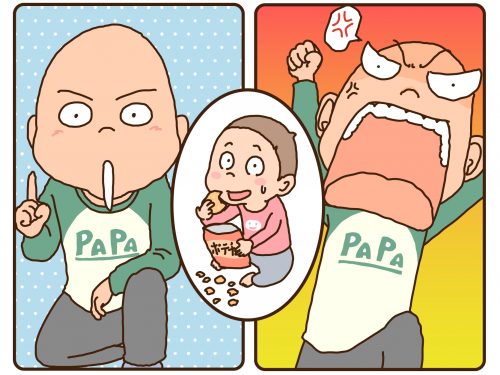Table of Contents
- Parenting Manga “Our Family’s Rules for Nudging
- Cooperation between husband and wife is essential! How to scold to nurture children’s hearts and minds
Parenting Manga “Our Family’s Rules for Nudging






Profile
Eiichi
After working for a design company in Tokyo, he became a freelance illustrator. He is a hard-working father who creates animation, manga, and illustrations, including winning the Yubari International Fantastic Film Festival’s International Short Film Showcase Division Excellence in Animation Award.
Cooperation between husband and wife is essential! How to scold to nurture children’s hearts and minds
For the healthy growth of children, the act of “scolding” is necessary at some point.
However, “I will always be bad at scolding,
Many fathers will say, “I got emotionally angry and regretted it.”
So this time,
We will cover how to scold children.
We spoke with Dr. Hideo Izumi, Associate Professor at the Faculty of Human Sciences of Tokyo City University, who mainly researches children’s lifestyle, about how to scold children to nurture their minds. He also explains what you should do before scolding and the key points of cooperation between husband and wife!

Cooperation between husband and wife is essential! How to scold children to nurture their minds
What is “scolding”? What is the difference between “scolding” and “getting angry”?
Simply put, I think we can say that “getting angry” means that the viewpoint or subject is “the parent,” i.e., emotionally telling the parent what you want them to do from their standpoint or convenience. For example, I want to take my child to preschool early so that I will not be late for work. However, the child is not getting ready and is watching TV. The parent gets impatient and says, “What time do you think it is? Get ready! and emotionally tell the child to get ready. This is not “scolding,” but “getting angry.
On the other hand, in “scolding,” the viewpoint or subject is the “child. In “scolding,” on the other hand, the viewpoint and subject is the child, and you control your emotions while thinking about what would be better for the child.
However, I do not believe that “getting angry” is necessarily a bad thing. If you get angry unnecessarily, you should apologize firmly to your child. Children also learn from a parent’s attitude of “honestly apologizing when you feel bad. In addition, I think it is necessary in some situations to “get angry” emotionally in order to “scold” the child.

What to do before scolding
I believe that scolding will always be necessary at some point in raising children. However, I believe that “scolding” is in a sense a “last resort,” and that there are things that should and can be done before scolding.
(i) Communicate the rules to the child.
The “rules” here refer to both social rules, such as “don’t steal from others,” and domestic rules, such as “go to bed by 9:00.
Before scolding, you need to share the rules with your child, including the reasons why they must be followed. It is important not to change the rules from time to time, but to consistently tell them the same thing over and over again.
(2) Create an environment in which the child can follow the rules.
For example, if you have a rule that you go to bed by 9:00 a.m., you can draw a picture of the process of going to bed, such as “bath at 8:00,” “brush teeth at 8:30,” etc., along with a diagram of the hands of a clock, and put it on the wall to help your child take the initiative in following the rule. It is also a good idea to turn off all lights except for those in the bedroom before 9:00 p.m. Visual encouragement is effective with children.
(iii) If a child is about to break a rule, warn him or her first.
Instead of suddenly “scolding” the child, first alert the child to the fact that he or she is about to break a rule so that he or she can act on his or her own. It is also effective to tell the child in a humorous way from the child’s point of view.
[Example.
“It’s too noisy, be quiet!” →Let’s talk in Ali’s voice!”
No more flapping your legs! →♪ “Let’s be ninjas and walk with stealthy steps ♪
It’s bedtime now, so turn off the TV!” →TV is also time for bedtime. Let’s say bye-bye.”
The two above should be conveyed by dad, while setting an example.
Points to consider when scolding
After sharing the rules with them and providing an environment for them, when they still seem to break the rules, the first step is to “warn” them as a warning. If they still fail to follow the rules, it is necessary to “scold” them for the first time. Important points for scolding are as follows.
(1) Listen to and accept the child’s thoughts and feelings.
There must be a child’s own reasons and feelings behind the behavior that led to the child being scolded.
First, let the child get his/her feelings out and affirm his/her feelings, then calmly tell him/her what needs to be communicated.
(2) Create an environment for scolding
For example, if you need to scold a child for watching TV, the child is so focused on the screen that the father’s words are difficult to reach. In such cases, it is more effective to intentionally create time and space for scolding by getting in the child’s line of sight or pausing the TV before telling the child.
It is also a good idea to move to a quieter room with fewer windows and objects so as not to distract the child before talking.
(3) Communicate in short, easy-to-understand sentences
It is counterproductive to give a lengthy scolding. It is better to explain in simple terms that the child can understand, such as, “Why are you scolding me?
4) Look the person in the eye and speak seriously and calmly.
Instead of being emotionally angry, speak in a calm and serious manner.

0 to 2 years old: “praise” rather than “scolding”.
It is difficult to say, but for children up to about two years old, there is basically little need to scold them. Adults should arrange the environment so that there is no need to scold, for example, “Keep dangerous things out of reach,” or “Put a sheet underneath the food to prevent spills.
It is also important to encourage desirable behavior by “praising” rather than “scolding,” especially if the child is under 2 years old. For example, if a child spits out a piece of food after putting it in his/her mouth, instead of scolding him or her by saying, “Don’t spit it out! Instead of scolding him, you should praise him by saying, “Great job putting the food in your mouth! and praise him, “Let’s put it in your mouth, too, Daddy. It’s delicious. Let’s go ahead and try to make it go down and swallow it. It is important for children’s growth to make the dining table a “fun place” rather than a “place to be scolded.
Key points for cooperative scolding between husband and wife
As is common in all aspects of child rearing, cooperation and collaboration between husband and wife are essential when it comes to “scolding. Points and hints for cooperation with mothers will also be explained.
(1) Communicate with the mother about the standard of scolding and how to scold.
For example, if you and Mom had agreed that you could watch TV for 30 minutes at night, but suddenly Dad scolded you, saying, “You must not watch TV at night! the child will be confused and rebel. It is important to communicate with mom on a regular basis about how and when to scold.
(2) Try to tell the story from each point of view, dad and mom.
If the child is not convinced by the mother’s explanation, the father can try to explain the situation from his own point of view.
By communicating a different point of view, children may be more easily convinced and may have a broader range of values and perspectives.
(iii) Try to change roles between dad and mom.
When a child is depressed after a scolding by the mother, the child will feel reassured if the father comes close to the child and treats the child gently or gives the child a gentle hug. It is also a good idea to divide the role of scolding between mom and dad, so that mom is usually the scold but dad scolds when the time comes. (Of course, it is fine if the roles are reversed.)
4) When mom or child is overly emotional, dad intervenes.
When mom and child are in a fight, and both parties are venting their emotions at each other, it may be better for dad to step in between them. In this case, it is important to listen to each other’s arguments calmly and accept them, rather than taking sides. If the child is talking in a way that hurts Mom, it would be good to tell her on her behalf, “If you talk that way to your precious Mom, both Mom and Dad will be sad.
It’s important to pamper them.
I would like to mention the importance of not only “scolding” but also “spoiling” them. For a child, the home is the last refuge. If a child is scolded outside the home, scolded by Mom at home, and scolded by Dad, he or she will feel as if he or she has lost his or her place.
It is also said that children who are not pampered well at home are more likely to have more problematic behavior outside the home.
Although they are able to eat alone at daycare or kindergarten, at home they may climb onto mom or dad’s lap or beg to be “ah-ed”…etc. In such cases, it may be a good idea to pamper them. They have only lived for a few years, so it is hard to keep trying all the time. A child will take three steps forward and two steps back repeatedly, while growing little by little and steadily.
There is no right answer to “scolding” or “parenting! The important thing is to “keep taking your child seriously
I have written on the subject of “scolding,” but in reality, there is no “right” answer to parenting. If there is a correct answer, I believe it is to “keep thinking seriously about your children. As a father of two children myself, I am constantly struggling with trial and error. Let’s work together to raise our children while worrying about what is best for their growth and happiness!












